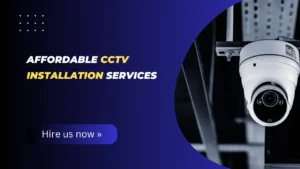In an era where personal security has become increasingly paramount, many homeowners in the United Kingdom have turned to Closed-Circuit Television (CCTV) systems as a means of safeguarding their properties. While these surveillance tools can provide peace of mind, they also raise important questions about privacy and the rights of neighbouring residents. A common concern that arises is whether it is permissible for a neighbour to have CCTV cameras directed towards another person’s home. This comprehensive guide aims to shed light on the legal, ethical, and practical considerations surrounding this complex issue.
As technology advances and CCTV systems become more affordable and accessible, it is crucial for both homeowners and their neighbours to understand the rules and regulations governing their use. This article will explore the various aspects of residential CCTV usage, including the legal framework, privacy concerns, and best practices for responsible implementation. By examining these topics in detail, we hope to provide clarity on the question of whether a neighbour can have CCTV pointing at your house in the UK, and offer guidance on how to navigate potential conflicts that may arise from such situations.
The Legal Framework Governing Residential CCTV in the UK
The use of CCTV systems in residential settings is subject to a complex web of legislation and guidelines in the United Kingdom. Understanding this legal framework is essential for both those who wish to install surveillance cameras and those who may be affected by their neighbours’ security measures.
Data Protection Act and GDPR
The cornerstone of CCTV regulation in the UK is the Data Protection Act 2018, which incorporates the principles of the General Data Protection Regulation (GDPR). These laws set out strict guidelines for the collection, processing, and storage of personal data, including video footage captured by surveillance cameras.
For homeowners using CCTV, it’s crucial to recognise that if their cameras capture images beyond the boundaries of their own property, they become data controllers under the law. This status brings with it significant responsibilities and potential liabilities if the regulations are not adhered to properly.
The Role of the Information Commissioner’s Office
The Information Commissioner’s Office (ICO) plays a pivotal role in overseeing and enforcing data protection laws in the UK. This independent body provides guidance on the lawful use of CCTV and has the authority to investigate complaints and issue penalties for non-compliance.
Homeowners considering the installation of CCTV systems are strongly advised to consult the ICO’s guidelines, which offer detailed information on how to ensure that their surveillance practices align with legal requirements.
Human Rights Act Considerations
Another important piece of legislation to consider is the Human Rights Act 1998, particularly Article 8, which enshrines the right to respect for private and family life. This act underscores the need for a balanced approach to home security that does not unduly infringe upon the privacy rights of others.
Privacy Concerns and Neighbour Relations
The installation of CCTV cameras can often lead to tensions between neighbours, particularly when there are concerns about privacy invasion. It’s important to approach this issue with sensitivity and an understanding of both parties’ perspectives.
Balancing Security and Privacy
While homeowners have a legitimate interest in protecting their property, this must be weighed against the privacy expectations of their neighbours. Striking the right balance requires careful consideration of camera placement, recording practices, and the extent of surveillance coverage.
Communication and Transparency
Open dialogue between neighbours is often the key to resolving CCTV-related disputes amicably. Homeowners planning to install cameras should consider informing their neighbours in advance and addressing any concerns they may have. This proactive approach can help prevent misunderstandings and foster a sense of community security.
Reasonable Expectations of Privacy
It’s important to recognise that individuals have a reasonable expectation of privacy within their own homes and gardens. CCTV systems that excessively intrude upon these private spaces may be considered a violation of privacy rights, even if installed with good intentions.
Best Practices for Residential CCTV Installation
To ensure that CCTV systems are used responsibly and in compliance with legal requirements, homeowners should adhere to a set of best practices when installing and operating their surveillance equipment.
Conducting a Privacy Impact Assessment
Before installing CCTV cameras, it’s advisable to conduct a privacy impact assessment. This process involves evaluating the necessity of the surveillance, identifying potential risks to privacy, and determining ways to mitigate these risks.
Appropriate Camera Positioning
Cameras should be positioned in a way that minimises the capture of footage from neighbouring properties or public spaces. The use of privacy masks or restricted viewing angles can help ensure that surveillance is limited to the intended areas.
Clear Signage and Notifications
In cases where CCTV cameras may capture images beyond the homeowner’s property, clear signage should be displayed to inform people that they are entering an area under surveillance. This transparency is not only a legal requirement but also helps to maintain good relations with neighbours and visitors.
Secure Storage and Limited Retention
Footage captured by CCTV systems should be stored securely and retained only for as long as necessary. Implementing robust data protection measures and establishing a clear retention policy are essential steps in complying with data protection laws.
Resolving Disputes and Seeking Redress
Despite best efforts to use CCTV responsibly, disputes may still arise between neighbours. Understanding the available options for resolution is important for all parties involved.
Informal Resolution Approaches
In many cases, disputes can be resolved through open and respectful communication between neighbours. Mediation services can also be helpful in facilitating constructive dialogue and finding mutually acceptable solutions.
Formal Complaints Procedures
If informal approaches prove unsuccessful, individuals with concerns about a neighbour’s CCTV system can file a formal complaint with the ICO. The ICO will assess the situation and may investigate if there are grounds to believe that data protection laws have been breached.
Legal Recourse Options
In more serious cases, legal action may be considered. This could involve seeking an injunction to prevent the use of intrusive CCTV or pursuing a civil claim for breach of privacy. However, legal proceedings should generally be seen as a last resort due to the potential costs and impact on neighbour relations.
The Impact of Smart Home Technology
The rise of smart home devices, including video doorbells and wireless security cameras, has added a new dimension to the residential surveillance landscape. These technologies often come with advanced features such as remote viewing and cloud storage, which can raise additional privacy concerns.
Integration with Home Security Systems
Many modern CCTV systems are integrated with broader home security setups, allowing for more comprehensive monitoring. While this can enhance overall security, it also increases the potential for data collection and privacy infringement if not managed carefully.
Considerations for Internet-Connected Devices
Internet-connected cameras bring additional security risks, such as the potential for hacking or unauthorised access to footage. Homeowners using these devices must take extra precautions to secure their networks and protect the privacy of both themselves and their neighbours.
Evolving Legal Framework
As technology continues to advance, the legal framework governing residential surveillance is likely to evolve. Homeowners and neighbours alike should stay informed about any changes in legislation or guidance that may affect the use of CCTV and smart home security devices.
The Role of Local Authorities and Police
Local councils and law enforcement agencies play an important role in addressing issues related to residential CCTV use. Understanding their involvement can be helpful for both those installing cameras and those with concerns about neighbouring systems.
Council Involvement in CCTV Disputes
While local authorities do not have direct jurisdiction over private CCTV systems, they may become involved in cases where cameras are causing significant distress or are believed to be in breach of planning regulations. Some councils offer mediation services to help resolve neighbour disputes.
Police Perspective on Residential CCTV
Law enforcement generally views responsibly installed residential CCTV systems as a positive tool for crime prevention and investigation. However, the police may also be called upon to address complaints about intrusive surveillance practices.
Balancing Community Safety and Individual Rights
Local authorities and police forces must navigate the delicate balance between promoting community safety through surveillance and protecting individual privacy rights. This often involves providing guidance to residents on the appropriate use of CCTV and intervening when necessary to address misuse.
Future Trends and Technological Developments
As surveillance technology continues to advance, it’s important to consider how future developments may impact residential CCTV use and the associated legal and ethical considerations.
Artificial Intelligence and Facial Recognition
The integration of AI and facial recognition capabilities into home security systems raises new privacy concerns and may necessitate additional regulations to protect individuals’ rights.
Miniaturisation and Discreet Surveillance
As cameras become smaller and more discreet, the potential for covert surveillance increases. This trend may lead to stricter regulations on the disclosure and visibility of residential CCTV systems.
Data Sharing and Smart City Initiatives
The potential for residential CCTV systems to be integrated into wider smart city networks could offer benefits for public safety but also raises questions about data privacy and consent.
Ethical Considerations in Residential Surveillance
Beyond legal compliance, there are important ethical considerations that homeowners should take into account when deciding to install and operate CCTV systems.
Respecting Community Values
The use of surveillance cameras can impact the overall atmosphere of a neighbourhood. Homeowners should consider how their actions align with community values and expectations regarding privacy and security.
Proportionality and Necessity
It’s important to critically assess whether the level of surveillance is proportionate to the security risks faced. Excessive monitoring can create an atmosphere of distrust and unease within a community.
Transparency and Accountability
Maintaining transparency about the presence and purpose of CCTV systems can help build trust with neighbours and demonstrate a commitment to responsible use of surveillance technology.
Educating Homeowners and Residents
Promoting awareness and understanding of the legal and ethical aspects of residential CCTV use is crucial for fostering responsible practices and minimising conflicts.
Community Workshops and Information Sessions
Local authorities or community groups could organise workshops to educate residents about their rights and responsibilities regarding CCTV use, helping to prevent misunderstandings and disputes.
Guidance Materials and Resources
Developing and distributing clear, accessible guidance materials can help homeowners navigate the complexities of CCTV installation and operation in compliance with legal and ethical standards.
Promoting Digital Literacy
As surveillance technology becomes more advanced, promoting digital literacy among residents can help them make informed decisions about their own security measures and understand the implications of neighbouring CCTV systems.
Conclusion: Striking a Balance Between Security and Privacy
The question of whether a neighbour can have CCTV pointing at your house in the UK is not one with a simple yes or no answer. It requires careful consideration of legal requirements, ethical principles, and community dynamics. While homeowners have a legitimate interest in protecting their property, this must be balanced against the privacy rights of their neighbours and the broader community.
By adhering to best practices, maintaining open communication, and staying informed about legal and technological developments, residents can navigate the complexities of residential CCTV use more effectively. Ultimately, the goal should be to create safer neighbourhoods while respecting the privacy and dignity of all individuals.
As technology continues to evolve, it is likely that the debate surrounding residential surveillance will persist. Ongoing dialogue between homeowners, neighbours, lawmakers, and technology providers will be essential in shaping policies and practices that protect both security and privacy interests in the digital age.




